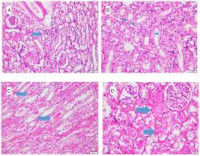Ameliorative Effects of Calcium-Based Supplements on Monosodium Glutamate-Induced Organ Injury in Rats
Main Article Content
Abstract
Monosodium glutamate (MSG), is the sodium salt of the amino acid; glutamic acid. MSG is known to improve food flavours, yet it poses significant health risks to consumers. This study aims to explore the potential ameliorative effect of calcium-based supplements against MSG-induced organ damage in rats. The experiment was divided into two phases; Phase I (Pre-MSG induction), and Phase II (Post-MSG induction). Ninety-six (96) female Wistar rats weighing between 100 and 120 g were allotted into five groups of nine rats each in each of the two phases. A daily dose of 750 mg/kg of MSG was administered intraperitoneally to the rats to induce tissue injury. Calcium-based supplements, including calcium, calcium D-glucarate, and the combination of both were administered to the rats prior to MSG exposure (Phase I), and after MSG exposure (Phase II). After 14, 28, and 42 days of treatment, the rats in both phases were sacrificed, and selected organs (brain, liver, and uterus) were harvested, and used for biochemical analysis, focusing on antioxidants biomarkers including catalase (CAT), glutathione peroxidase (GPx), and malondialdehyde (MDA) levels. Results indicated that the pre- and post-administration of calcium-based supplements significantly mitigated MSG-induced tissue damage by increasing catalase, and glutathione peroxidase activities, and decreased MDA levels, particularly in the brain and liver both pre- and post-administration, suggesting a potential protective effect against MSG-induced organ injury by enhancing endogenous antioxidant activity. In conclusion, the findings from this study suggest that calcium-based supplements may offer protection against MSG-induced organ damage by modulating antioxidant mechanisms.
Downloads
Article Details

This work is licensed under a Creative Commons Attribution-NonCommercial-NoDerivatives 4.0 International License.
References
Nguyen Thuy L, Salanță L, Socaci S, Tofana M, Fărcaş A, Pop C. A mini review about monosodium glutamate. Bull Univ Agric Sci Vet Med Food Sci Technol. 2020; 17(1):1-2.
Husarova V and Ostatnikova D. A Review. J Med Res. 2013; 2013:1-12.
Maluly HDB, Arisseto-Bragotto AP, Reyes FGR. Monosodium glutamate as a tool to reduce sodium in foodstuffs: Technological and safety aspects. Food Sci Nutr. 2017; 5(6):1039-1048.
Adedoyin D, Ojokuku AS, Bamidele FA. The Effect of Aqueous Extract of Ocimum gratissimumOn Monosodium Glutamate Induced Biochemical Changes in Albino Rats.Trop J. Nat Prod Res. 2020; 4(2):27-30.
Zanfirescu A, Ungurianu A, Tsatsakis AM, Nițulescu GM, Kouretas D, Veskoukis A, Tsoukalas D, Engin AB, Aschner M, Margină D. A review of the alleged health hazards of monosodium glutamate. Compr Rev Food Sci Food Saf. 2019; 18(4):1111-1134.
Kamal N, Elizabeta Z, Jonathan S. Extensive use of monosodium glutamate: a threat to public health?. EXCLI J. 2018; 17:273-278.
Evbuomwan S, Omotosho O, Akinola O. Monosodium glutamate: health risks, controversies and future perspectives. Trop J Pharm Res. 2023; 25-41.
Altunkaynak P and Avuloğlu-Yılmaz E. Food additives and genotoxicity. Int J Sci Lett. 2021; 3(2):109-120.
Tankeu AT, Ndip Agbor V, Noubiap JJ. Calcium supplementation and cardiovascular risk: a rising concern. J Clin Hypertens. 2017; 19(6):640-646.
Shin CS and Kim KM. The risks and benefits of calcium supplementation: a review. Endocrinol Metab (Seoul). 2015; 30(1):27-34.
Yang G, Ge S, Singh R, Basu S, Shatzer K, Zen M, Liu J, Tu Y, Zhang C, Wei J, Shi J, Zhu L, Liu Z, Wang Y, Gao S, Hu M. Glucuronidation: driving factors and their impact on glucuronide disposition. Drug Metab Rev. 2017; 49(2):105-138.
Afolabi IS, Nwachukwu IC, Ezeoke CS, Woke RC, Adegbite OA, Olawole TD, Martins OC. Production of a new plant-based milk from Adenanthera pavonina seed and evaluation of its nutritional and health benefits. Front Nutr. 2018; 5:1-13.
Bock PP, Kramer R, Pavelka M. Cell Biology Monographs 7; Peroxisomes and related particles. Berlin: Springer. 1980; 7:44-74.
Paglia DE, Valentine WN. Glutathione peroxidase. J Lab Clin Med. 1967; 70(1):158 – 169.
Chance B and Maehly AC. Assay of Catalase and Peroxidase. Meth Enzymol. 1955; 2:764-775.
Ohkawa H, Ohishi N, Yagi K. Assay for lipid peroxides in animal tissues by thiobarbituric acid reaction. Anal Biochem. 1979; 95(2):351-358.
Singh K and Ahluwalia P. Effect of monosodium glutamate on lipid peroxidation and certain antioxidant enzymes in cardiac tissue of alcoholic adult male mice. J Cardiovas Dis Res. 2012; 3(1):12–18.
Eweka AO, Igbigbi PS, Ucheya RE. Histochemical studies of the effects of monosodium glutamate on the liver of adult wistar rats. Ann Med Health Sci Res. 2011; 1(1):21-29.
Farombi EO and Onyema OO. Monosodium glutamate-induced oxidative damage and genotoxicity in the rat: modulatory role of vitamin C, vitamin E, and quercetin. Hum Exp Toxicol. 2006; 25(5):251-259.
Singh K and Ahluwalia P. Effect of monosodium glutamate on lipid peroxidation and certain antioxidant enzymes in cardiac tissue of alcoholic adult male mice. J Cardiovas Dis Res 2012; 3(1):12–18.
Miyamoto Y, Koh YH, Park YS, Fujiwara N, Sakiyama H, Misonou Y, Ookawara T, Suzuki K, Honke K, Taniguchi N. Oxidative stress caused by inactivation of glutathione peroxidase and adaptive responses. Biol Chem. 2003; 384(4):567-574
Matough FA, Budin SB, Hamid ZA, Alwahaibi N, Mohamed J. The role of oxidative stress and antioxidants in diabetic complications. Sultan Qaboos Univ Med J. 2012; 12(1):5-18


